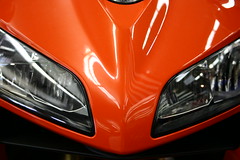 Are you within the 98% of the population* who wish they could get a motorcycle? Congrats! It's is easier than it seems, and it also can be much safer than you think.
Are you within the 98% of the population* who wish they could get a motorcycle? Congrats! It's is easier than it seems, and it also can be much safer than you think.
*The other 2% are unable to wish.
Getting on a bike
For someone who doesn't have a nagging friend trying to convince everyone to get a motorcycle (like me), it can seem like a complicated affair. Maybe you think you'll never pass the test. Maybe you think they are too expensive, heavy, ugly, racey, wimpy or loud for you. Well, whatever you think, you're wrong (with that attitude, you are!).Getting on your bike is as simple as:
- Take the MSF course
- Get licensed
- Hunt around for the bike you like
It really is that simple. I'll go into more detail in future posts.
There is a lot of misinformation regarding motorcycles, like how safe (or unsafe) they are. There is also a lot of opinions, especially regarding "the right bike" or even riding techniques. With this blog, I will attempt to dispel myths and offer you the information that will make your present or future riding experience more enjoyable.
On your path to riding, the MSF course comes first because you don't need to purchase anything and it allows you to get a feeling for riding, just in case you decide you don't like it. It is definitely The Right Way to start riding, not to mention quite fun, even for people who are not complete novices.
 Getting licensed is... pretty obvious. In Virginia, for example, you wouldn't be able to ride alone, ride in the dark, ride on highways or carry passengers without a proper license. Regulations are similar in the other states. (In Mexico, however, your driver's license is also a motorcycle license.)
Getting licensed is... pretty obvious. In Virginia, for example, you wouldn't be able to ride alone, ride in the dark, ride on highways or carry passengers without a proper license. Regulations are similar in the other states. (In Mexico, however, your driver's license is also a motorcycle license.)Choosing and buying your own bike is probably the most fuzzy part, since there's not really a science to it regarding what "the right bike is" (riding, on the other hand, is part physics and part psychology). I'll preemptively say that I can only state my limited opinion on that matter, hoping that it helps you and not attempting to get into arguments of opinion.
When it comes to buying a motorcycle there are numerous options, some of which will suit you. If you are a bit afraid of motorcycles (too heavy, too powerful, what if I drop it) then you could consider a used 250 Kawasaki Ninja or a Honda Nighthawk. These bikes are big enough to be ridden in a highway (or a hill!), yet relatively light and forgiving for learners. It almost seems like they were made for dropping them while learning. Some people opt for a slightly bigger bike that will grow with them. This is a common choice for people who are not worried that they're too light to handle a motorcycle. Popular choices include the Suzuki SV650 and GS500. There are a TON of choices.

The one thing you must do when choosing is sit on the motorcycle and get a feel for it. Is it comfortable? Can you comfortably put your feet on the ground? Is the riding position too "sporty"? Sport bikes are taxing for longer rides (more than an hour or two), whereas cruisers are good for long rides (cross country trip!) yet horrible for stunts :)
If you feel like doing exhaustive research on used bikes, read the Used Motorcycle Evaluation Guide. Don't feel overwhelmed by it, it's best if you find a mechanic or an experienced buddy to help you out.
Safer than you think
Motorcycles are often seen as a death wish. While it is true that you are much less protected in case of an accident, it is possible to ride for many years without even a scrape and without the need for luck. Did you know that:- The motorcycle riders involved in accidents are essentially without training; 92% were self-taught or learned from family or friends.
- More than half of the accident-involved motorcycle riders had less than 5 months experience on the accident motorcycle, although the total street riding experience was almost 3 years.
These statements were taken from The Hurt Report, a technical report based on studies by the University of Southern California in the early 80's. They reflect the fact that education makes a huge difference when riding.
In the following posts, I'll discuss a range or subjects, from basic safety to "how to lane split"
No comments:
Post a Comment